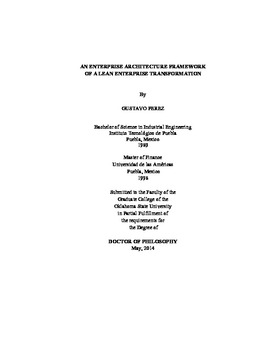| dc.contributor.advisor | Ingalls, Ricki Gene | |
| dc.contributor.author | Perez, Gustavo | |
| dc.date.accessioned | 2015-06-17T20:07:26Z | |
| dc.date.available | 2015-06-17T20:07:26Z | |
| dc.date.issued | 2014-05 | |
| dc.identifier.uri | https://hdl.handle.net/11244/15061 | |
| dc.description.abstract | Today's business environment is characterized by fast changes, uncertainty, variability, and unpredictability. To be more competitive, firms have to improve their operations performance. To achieve this, one path is to develop a strategy based on the Lean philosophy across the entire organization. However, to transform a company into a Lean Enterprise is not simple. After examining the literature, it was determined that there is no comprehensive Lean framework that provides a complete integration of the Lean elements into a coherent whole or a detailed step-by-step methodology for Lean manufacturing implementation. | |
| dc.description.abstract | This dissertation presents an Enterprise Architecture Framework for a Lean enterprise transformation to guide a company towards operational excellence. This framework integrates holistically the main components crucial to transforming a traditional enterprise into a Lean Enterprise. It can be useful in supporting the whole organization in its Lean journey to transform the company into a more productive system. | |
| dc.description.abstract | For this research, several Lean frameworks, the most well known national quality award models for operational excellence, and the main architecture frameworks for enterprise integration were identified and analyzed. Concepts derived from this analysis contributed to the design and understanding of the enterprise architecture framework. The framework has been designed to guide a company through a Lean enterprise transformation using an analytical, logical, and systematic approach. This approach considers the main tools and principles of Industrial Engineering as well as Lean Manufacturing and Business Improvement Programs. It contains layers that represent the enterprise views. Each layer is divided into groups and each group is broken down into components of the same category. Both layer components and phases have been integrated into a coherent whole, which forms the Lean enterprise transition roadmap. Phases one to four of the framework have been tested in a German engine parts company in the automotive sector. | |
| dc.description.abstract | The methodology used for this dissertation was developmental research, using a qualitative research design approach that encompasses inductive logic to develop the framework and deductive logic to test it. The enterprise architecture framework was designed using an analytical, logical, and systematic approach, based on a three-dimensional thinking scheme. | |
| dc.format | application/pdf | |
| dc.language | en_US | |
| dc.rights | Copyright is held by the author who has granted the Oklahoma State University Library the non-exclusive right to share this material in its institutional repository. Contact Digital Library Services at lib-dls@okstate.edu or 405-744-9161 for the permission policy on the use, reproduction or distribution of this material. | |
| dc.title | Enterprise Architecture Framework of a Lean enterprise transformation | |
| dc.contributor.committeeMember | Kolarik, William J. | |
| dc.contributor.committeeMember | Kamath, Manjunath | |
| dc.contributor.committeeMember | Tilley, Daniel S. | |
| osu.filename | Perez_okstate_0664D_13417.pdf | |
| osu.accesstype | Open Access | |
| dc.type.genre | Dissertation | |
| dc.type.material | Text | |
| dc.subject.keywords | business improvement programs | |
| dc.subject.keywords | enterprise architecture framework | |
| dc.subject.keywords | industrial engineering | |
| dc.subject.keywords | lean enterprise transformation | |
| dc.subject.keywords | lean system | |
| dc.subject.keywords | lean workplace | |
| thesis.degree.discipline | Industrial Engineering and Management | |
| thesis.degree.grantor | Oklahoma State University | |
